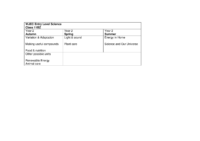Science
Curriculum Intent
Our science curriculum is designed with the intent that our students will develop a good understanding of the world around them, and an understanding of how major scientific ideas have developed in society, preparing them for life in an increasingly scientific and technology world. We provide opportunities for our students to share their learning in the Science Teaching Channel, developed with the support of deaf scientists. We therefore embrace their expertise and recognise the valuable contributions that they can make to the delivery of an engaging science curriculum. The Science Teaching Channel is a useful learning resource for deaf students in education all over the UK. Our aim is to continue to build science capital for all our students, regardless of their starting point in education so that they are inspired to continue to use science in their everyday life, future education and careers.
We will deliver a science curriculum that
- Builds upon prior knowledge and a progression of skills to ensure all students have a secure understanding and knowledge of key science concepts.
- Provides opportunities for our students to develop vocabulary, in both English and British Sign Language (subject specialist signs) and literacy skills
- Inspires and engages our students through practical sessions
- Develops students with an awareness of the key role that the Science Teaching Channel plays within our school community and the deaf community.
- Encourages our students to be self-motivated, independent, curious and resilient learners by developing inquiry-based skills.
- Provide opportunities for students to think about STEM related education and careers.
Students are grouped according to ability into sets. KS3 students follow the Activate Science three-year programme of study which is compliant with the new KS3 Science National Curriculum. Students on this course will have regular end of topic tests and are given a clear understanding of how to progress through a higher level of science application. There will be opportunities for developing practical investigative skills.
Students who are able to complete the programme within the three-year plan are then will move onto starting the KS4 AQA GCSE Combined Science qualification in Year 10, with the aim of completing in Year 11. Students will study all three sections – Biology, Chemistry and Physics and will end up with two GCSEs across all three-science subjects.
Sets which need more time to consolidate a greater understanding of the KS3 programme, continue with the topics until the end of year 9 and will start an AQA Entry Level Science in year 10, these students will have the full two years to complete this programme at KS4. Where sets need more time to understand the content of the GCSE Combined Science course, they will have the full three years to complete the GCSE course.





